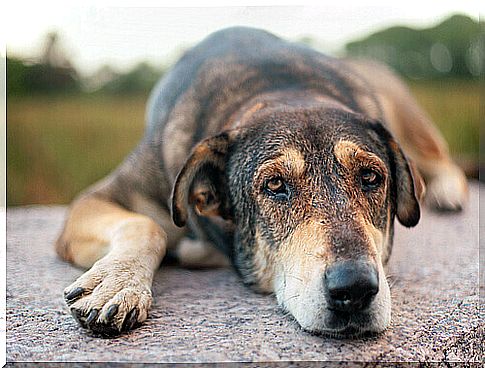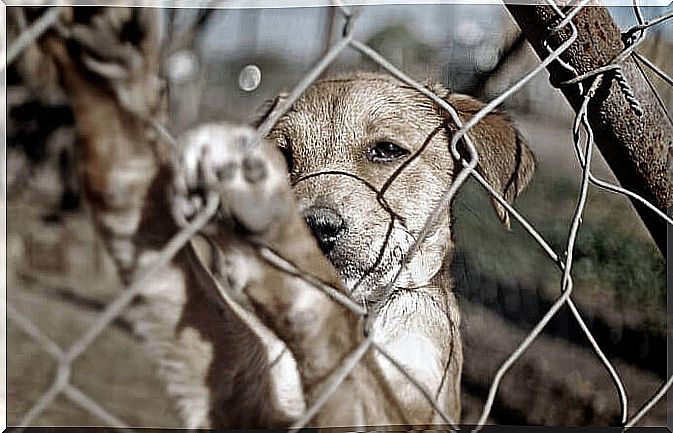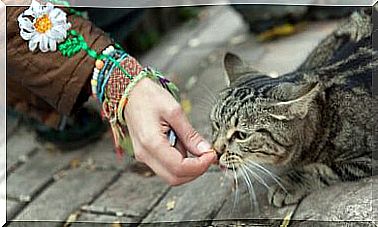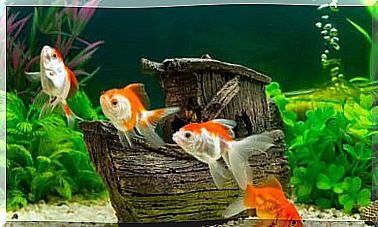How To Treat Abused Dogs?

There have always been cases of mistreated dogs. But thanks to the Internet and social media, we are able to discover more cases of abandoned or mistreated animals than ever before.
Our first reaction when seeing a dog in this state is to say “poor thing” and feel sorry for these animals that have not had much luck in life. However, pity is a useless feeling and does not help the animal at all. Next, we will reflect on how we should treat abused dogs.
The penalty: a useless feeling
Emotions are involuntary and should not be repressed. However, as we are rational beings, we can change the way we think to change what we feel.

Source: José María Pérez Nuñez
It is natural and normal to feel sorry for those less fortunate, especially when it comes to animals, as they are helpless beings who never deserve any of the harm that sometimes happens to them. Animals are always victims of circumstance and humans can be very cruel.
But we insist that grief is a paralyzing feeling. Furthermore, when feeling sorry for, we do nothing to change or prevent the animal’s suffering. Pity is an emotion that makes us feel bad, but it does nothing more than that. It’s a totally useless feeling for anyone who needs help.
It is also important to say that the sentence can turn into a feeling of impotence, which will only harm those who most need help. In this case, our dear four-legged friends.
How to treat a battered dog and how we should feel about him
We can feel many other things instead of pity. Any feeling that moves us to change the situation of an abused or abandoned animal is much more helpful.
To reframe our feelings, we have to change the way we think. For example, instead of thinking “poor things”, we can think the following: “what can I do to protect this animal that has been through so much?” or “what can I do to help this battered animal?”
We should change the penalty for determination, because we will be doing something really useful for some animal in particular or for others in a similar situation. With this, instead of being stagnant, we will do something productive for a being who really needs it.
In this way, we will be helping the one who is taking care of it, we will protect another animal so that it does not suffer in the future, or we can even take care of that animal and make sure personally that no one will harm it again.
We can also feel compassion instead of pity, which is a result similar to determination: we take it a step further and, at the same time, do something useful or necessary. Compassion helps us alleviate suffering, helps us take responsibility for changing a bad situation.
If we see a sick animal on the side of a road and feel sorry for it, we will sigh for it, but we will move on. However, if we see a sick animal by the side of a road and feel compassion, we will likely take it to the vet and try to relieve its pain.
With determination, we will change the present and future of this animal: first we will take care of it and then we will not stop until we find a permanent family that will take care of the animal for the rest of its life.
It’s very easy to feel pity rather than awe. Instead of regretting the evil that the abandoned dog went through, we can admire his ability to overcome and feel proud for him, since he overcame such a difficult situation.
Because if there is one thing that characterizes dogs, it is their tenacity, will and willingness that they always have to overcome problems. Admiration helps us understand animals, especially dogs, with this great innate ability they have.
So it helps to treat dogs with respect rather than pity. That’s because, in place of abused dogs, they become survivors, heroes capable of overcoming anything that comes their way. We trust them more and they trust us more.
We must not look at them with pity
When we have a mistreated or abandoned dog in front of us, we usually feel the fear and anxiety that the animal feels. We can do a lot to help him overcome his fears, but the least we can do is not look at him with that pitying look.
Our look of pity conveys concern and fear, in addition, we are the fundamental reference for our dogs. If we are worried, the dog will be worried. He will always be afraid. Treating a battered dog correctly is critical to its recovery.

That way, if we feel proud to have a survivor at home, we will enjoy all the advances he makes more, and he will also feel proud and confident. The world will no longer be full of worried faces that only convey fear: we will accompany and support your recovery.
Act in favor of abused animals
When we read a story about animal abuse, we can do a lot more than feel sorry for. We can help the person who took in this abandoned animal to pay for veterinary appointments or feeding the pet.
We can also help to look for someone who wants to permanently adopt the animal when it is already recovered. Maybe we can participate in a society that protects animals that do prevention and, thus, contribute to reduce the number of cases of abuse that we see so much out there.
In addition, we can be the ones who denounce, collect and take care of abused animals. Every volunteer, every pair of hands helping at the shelter is fundamental to the functioning of animal protection societies and kennels, and literally saves lives.
Sorry, we can’t do any of that. Penalty paralyzes us and prevents us from acting, and an abandoned and mistreated animal needs someone to act for it.









